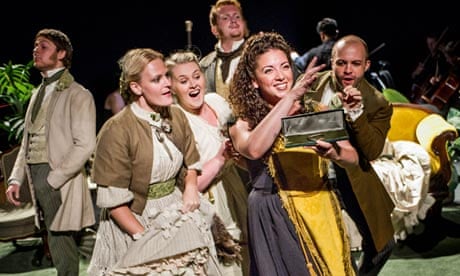Julian Philips's 2009 opera joins Glyndebourne's tour repertory this autumn. It's a chamber-scale piece, written for 10 principals, several of whom occasionally bond together into a choral group, and with a pit ensemble of strings, guitars and piano. Philips demonstrates a good range of technical skills, and the vocal and instrumental writing is always neat and effective, though it is curious to encounter such a recent work that sounds in large part as if it could have been written by, say, Lennox Berkeley.
Philips's source is a story by the admired 19th-century Portuguese writer Eça de Queirós. Edward Kemp's libretto takes a leisurely stroll through a tale in which the shy Godofredo comes home to discover his wife Ludovina and his business partner Machado in a compromising situation on the yellow sofa. He sends her back to her father, deciding that, as an aggrieved Latin husband, the honourable thing to do is to challenge her lover to a duel to the death. His friends, though, painfully aware how comically unsuited Godofredo is to violent heroics, manage to dissuade him. Eventually he bumps into his wife outside the opera house, and matters are put, it seems, to rights.
It's easy to imagine how brilliantly and succinctly Ravel might have treated such material. Philips's score is at its best in its plentiful use of pastiche and parody, whether in the frequent interventions in fado style from the singing sofa – whimsically named Amarela – delivered in a smoky mezzo and with slinky, cabaret-like movements by Lauren Easton, or in the final duet between Michael Wallace's tremulous Godofredo and Gabriela Istoc's mildly guilty Ludovina, which quotes Donizetti before moving into a rather halting Puccinian lyricism. There's also a lively trio for Godofredo's sniggering friends and Machado's second, Nunes Vidal, sung by the excellent Gareth Huw John. Elsewhere, too much of the score slides into adept anonymity.
Gareth Hancock conducts persuasively, however, bringing out the skill of the orchestration. Frederic Wake-Walker's staging is often too busy, applying relentless mugging and funny walks at all available opportunities, and quite a few others, and there's far too much "comic" business from the maid Margarida; but the lightweight narrative is clearly sketched and the two central performances nicely observed.

Comments (…)
Sign in or create your Guardian account to join the discussion